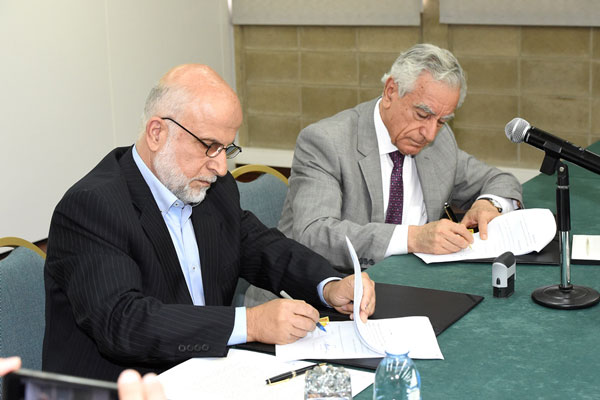Each year, the LAU community celebrates the brightest minds among its student body, acclaiming the success of hundreds of students who have achieved a cumulative average (GPA) of no less than 3.5 and, as a result, were declared members of the university's Honor Society.
More than 800 members―some returning, others newly inducted―gathered at ceremonies in Beirut and Byblos where deans from all seven schools handed certificates and pins to each and every one of them in celebration of their hard work and dedication to academic excellence.
“The true value of this ceremony does not lie in receiving the award as much as in earning the award,” said Hagop Jamkojian addressing his fellow students and the hundreds of proud family and faculty members in the grand courtyard of the Byblos campus.
“LAU is a multicultural space of integration and coexistence that molds together different students from different places and backgrounds so that it looks like a mini-world,” added Jamkojian. The engineering student―who has maintained a GPA of 4.0―spoke of the education and enlightenment he and his peers had received at LAU that had prepared them to be leaders of the future and promoters of peace.
Stephanie Semaan, another Byblos-based student with the highest GPA at the School of Business, echoed the sentiment. “The world needs creators, innovators, and we are tomorrow’s game changers. Our decisions today and capabilities should definitely lead us to a place where our LAU will be forever proud.”
In his address, LAU President Joseph G. Jabbra expressed great pride and urged both graduating and continuing students to keep working hard and to contribute to the much-needed development of Lebanon and the region. “You have been an enriching element in our community. Imbued with the values and ethical standards you have learned here, you will go out … and serve society with determination… to say no to sectarianism, to corruption, to say no to the destruction of our institutions that have brought us to the brink of disaster. You need to make a difference … and we have faith in you,” he enthused.
Those students who, by their activism and determination, have already shown dedication to their community and society are recognized each year through the Riyadh Nassar Leadership Award and the Rhoda Orme Award. This year the awards went to Hanan Ghamloush and Sarah Kaddoura respectively in Beirut and Jason Nasser and Carol Najd respectively in Byblos. Also acknowledged was student of computer science Anthony Nahoul who received the Sara Khatib Inspiration Award, named after the former LAU student who lost her difficult but inspirational battle with cancer in 2014.
Pride and hope were the dominant emotions throughout the ceremonies, well expressed in the address of Provost George K. Najjar: “Soon enough you will transition from being students to being alumni, but your achievements will stay behind you. You will leave behind an example for generations that are yet to come. You will leave behind a standard to match, and some standard it is.”
![[Photo]](http://www.lau.edu.lb/news-events/images/student-honor-society-2016-02-big.jpg)
Byblos celebrated students surrounded by their deans and university officials.
![[Photo]](http://www.lau.edu.lb/news-events/images/student-honor-society-2016-01-big.jpg)
“Serve society with determination,” President Jabbra told the students.
![[Photo]](http://www.lau.edu.lb/news-events/images/dance-launy-fjk-01-big.jpg)
![[Photo]](http://www.lau.edu.lb/news-events/images/aacsb-accreditation-celebration-02-big.jpg)
![[Photo]](http://www.lau.edu.lb/news-events/images/aacsb-accreditation-celebration-01-big.jpg)
![[Photo]](http://www.lau.edu.lb/news-events/images/sexual-exploitation-kafa-01-big.jpg)
![[Photo]](http://www.lau.edu.lb/news-events/images/women-ine-leadership-murer-01-big.jpg)
![[Photo]](http://www.lau.edu.lb/news-events/images/umayyad-route-2016-01-big.jpg)
![[Photo]](http://www.lau.edu.lb/news-events/images/writing-center-training-2016-01-big.jpg)
![[Photo]](http://www.lau.edu.lb/news-events/images/18-university-theater-festival-01-big.jpg)
![[Photo]](http://www.lau.edu.lb/news-events/images/18-university-theater-festival-02-big.jpg)
![[Photo]](http://www.lau.edu.lb/news-events/images/phoenician-dna-study-01-big.jpg)

![[Photo]](http://www.lau.edu.lb/news-events/images/rhodes-scholarships-01-big.jpg)
![[Photo]](http://www.lau.edu.lb/news-events/images/bdw-2016-01-big.jpg)
![[Photo]](http://www.lau.edu.lb/news-events/images/celiace-awareness-day-01-big.jpg)
![[Photo]](http://www.lau.edu.lb/news-events/images/nursing-recognition-ceremony-01-big.jpg)
![[Photo]](http://www.lau.edu.lb/news-events/images/som-hooding-ceremony-02-big.jpg)
![[Photo]](http://www.lau.edu.lb/news-events/images/som-hooding-ceremony-01-big.jpg)
![[Photo]](http://www.lau.edu.lb/news-events/images/byblos-comencement-2016-03-big.jpg)
![[Photo]](http://www.lau.edu.lb/news-events/images/byblos-comencement-2016-02-big.jpg)
![[Photo]](http://www.lau.edu.lb/news-events/images/byblos-comencement-2016-01-big.jpg)
![[Photo]](http://www.lau.edu.lb/news-events/images/commencement-sas-beirut-2016-02-big.jpg)
![[Photo]](http://www.lau.edu.lb/news-events/images/commencement-sas-beirut-2016-01-big.jpg)
![[Photo]](http://www.lau.edu.lb/news-events/images/commencement-business-2016-02-big.jpg)
![[Photo]](http://www.lau.edu.lb/news-events/images/commencement-business-2016-01-big.jpg)